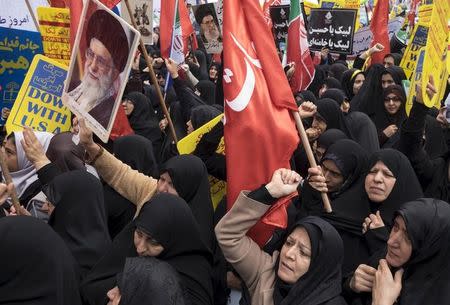Iran's hardliners mark hostage anniversary with 'infiltration' warning
By Bozorgmehr Sharafedin DUBAI (Reuters) - Thousands of Iranians rallied to celebrate the anniversary of the 1979 hostage-taking at the U.S. embassy on Wednesday, as hardliners alleged Western "infiltration" following a landmark nuclear deal with world powers. President Hassan Rouhani, however, in remarks highlighting division between moderates and hardliners, criticised the arrest of at least two journalists, the latest in a series of detentions also including dissident writers and artists. "We should not arrest people without reason, making up cases against them and say they are a part of an infiltration network," Rouhani told a cabinet meeting. Demonstrators gathered in front of the abandoned U.S. Embassy in Tehran chanting "death to America" and urging Iran's foreign minister and chief nuclear negotiator, Mohammad Javad Zarif, "Don't trust the Americans." The U.S. embassy was sacked by students in the early days of the Islamic Revolution in 1979. The ensuing U.S. hostage crisis lasted 444 days and Washington and Tehran have yet to restore diplomatic ties. Some protesters dragged a coffin marked "Obama" through the street while others carrying long balloons representing Iran's latest ballistic missile, which was tested in October in defiance of a United Nations ban. The yearly commemoration was the first since the Islamic Republic reached an agreement with six world powers on July 14 that imposed strict limits on Iran's nuclear programme in exchange for a removal of sanctions that have isolated it and hobbled its economy. While moderate President Rouhani is keen to normalise relations with the West after the deal, supporters of Supreme Leader Ayatollah Ali Khamenei used this year's rallies across the country to argue the historic agreement would not lead to any rapprochement between Tehran and Washington. "Western countries, especially the United States, are trying to take advantage of the situation in Iran after the nuclear deal to normalise relations with Tehran and infiltrate the country," Iran's powerful Revolutionary Guards (IRGC) said in a statement published on the Fars news agency on Tuesday. JOURNALISTS ARRESTED The dispute between Rouhani and hardliners appeared to escalate on Wednesday over the arrest of at least two journalists, Isa Saharkhiz and Ehsan Mazandarani, two days ago. Advocacy group Reporters Without Borders on Wednesday said two other journalists, Afarin Chitsaz and Saman Safarzaie, had been arrested. Reuters was unable to immediately confirm those two arrests. The Committee to Protect Journalists, another advocacy group, said at least five reporters had been arrested in recent days, and called on Iran to immediately release all detained journalists. Iranian authorities have also recently arrested an American-Lebanese man who they said was linked to the U.S. military and a U.S.-Iranian businessman while he was visiting family in Iran. A member of the Revolutionary Guards' Intelligence Organization said on Tuesday the arrest of an unspecified number of journalists and online activists was part of a security operation to destroy "an infiltration network related to Western countries". "They were trying to save the U.S. image and make society ready for the official presence of the Americans in Iran," the man, identified only as Asef, told state TV by phone, saying this process was "designed and funded by American spy agencies". Hamid Rasaei, a hardline Iranian MP, was quoted by Fars as saying "we managed to capture the U.S. embassy in the early years of the Revolution but there are still espionage dens in our newspapers." (Reporting by Bozorgmehr Sharafedin; Additional reporting by Sam Wilkin; Editing by Ruth Pitchford)



